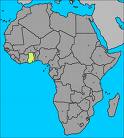Last Wednesday was another day collecting data from the labor ward. The labor ward is simultaneously coveted and avoided by our team members. It is coveted because you get to witness births as you copy the deliveries entered in the book. And it is usually followed by avoiding having to go there the next day because it takes so long to enter the 30+ recorded deliveries into our database.
I really enjoy the labor ward. I have been thinking a lot this year about going on to an accelerated nursing degree program after I finish my MPH, or at least becoming a certified doula. So getting the chance to see the midwives at work is really special.
When I entered the delivery area, I immediately noticed that both women occupying the two delivery beds had a baby’s head already sticking fully out. Soon after I sat down behind the desk, the midwife closest to me delivered the rest of the baby. But the midwife with the other woman seemed to be taking her time and not really paying attention to the woman before, who was lying back quietly. I kept worrying the baby would pop out while she was looking away. But then the midwife left the woman, and I kept glancing up the next couple of minutes, looking at the scrunched up face protruding from the vagina. Finally it dawned on me that this other baby was probably an IUD – inter-uterine death. I asked and it was confirmed. Apparently, when a baby dies inside the womb, the woman’s body fails to properly expel it through contractions. Furthermore, babies actually assist in getting themselves out by squirming and rotating. So if a baby had died in utero, in is very difficult for it to be delivered.
Finally after about 15 minutes, the midwife came and spent the five minutes very forcefully pulling and yanking out the baby. It looked so painful. The poor baby’s body was already macerated- caving in on itself- which meant it must have been dead for a week or so.
The mother never cried, held the baby on her stomach as the midwife cleaned it off. She allowed no signs of mourning. This is one of the things we often muse about at this hospital: does the lack of emotion we witness among women as they watch their babies die – or the women in the beds and on the floor next to them die – have more to do with an emotional blunting they use to guard against the anguish of death, or the sad fact that nurses yell and hit them anytime they cry or scream out, telling them they are disturbing the other patients?
The former is something that has already set in for me. I am witnessing or recording at least one death each week, yet I have yet to cry or feel any extreme emotion other than an empty sadness. It should not be this way. Maternal and infant death should not seem so normal, especially in one of the best hospitals in
The next delivery came with its own double – twins! I was asking the midwife questions about what she looks for when she examines the placenta, when a women came waddling in crying out. The nurses yelled at her and smacked her arm as her water broke all over the floor (apparently they yell at the women for pushing too early and not holding back), and she barely made it up onto the table before the baby’s head popped out. The nurse barely had time to put on gloves before catching the newborn. I thought the excitement was all over until 2 minutes later I glanced up in time to see another baby slide out. They were both beautiful, health little girls.
It seemed to be the week of twins and doubles- the two side by side births, the twins I saw born, plus two more women we interviewed who had twins. We also had two women die in one day from obstetric complications. But then today the spell was broken as we ran into triplets! A woman who had suffered from ante-partum hemorrhage had delivered three, healthy girls vaginally! Auntie Mary said I should try for the same so I could get it all over in one pregnancy. I told her it was triple the pain. She told me that no, giving birth was just like when you accidentally bite your tongue…
Being here at this hospital, I am constantly witnessing an intricate dance between Life and Death. I keep trying to find a pattern in it, but it is sort of like a Celtic knot. One minute I am witnessing a still birth, the next minute I have the privilege of bringing one of the women I interviewed her baby whom she had yet to see after she recovered from eclampsia. Here in












No comments:
Post a Comment